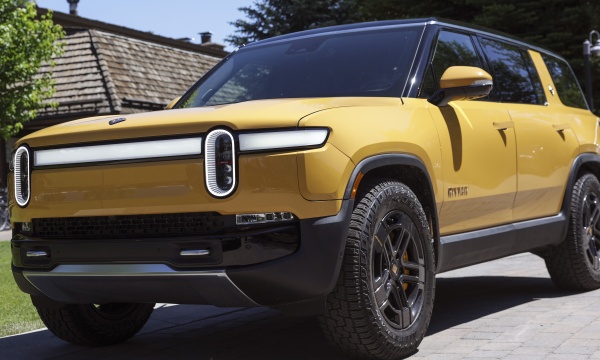Another significant adjustment is likely to be made to the federal tax credits for electric vehicles, which have been a source of confusion for automakers and car buyers alike for months.

The federal tax credits for electric vehicles, which have been a cause of confusion for automakers and car shoppers alike for months, are about to go through another big change.(Photo: WBFO)
Only a Few Cars Will Receive Tax Credit Due To Battery Requirements
Less vehicles will be eligible for the existing $7,500 tax credit as of Tuesday. Due to new battery sourcing requirements, some automobiles will only receive a $3,750 credit while others will no longer receive any credit at all.
According to the new regulations, which were unveiled last month, a specific proportion of battery materials and components must be obtained from North America or a partner country of the United States. They were a component of the comprehensive climate package that revised the tax credit for electric automobiles and are intended to encourage domestic production.
The IRS is anticipated to publish the list of approved automobiles by Tuesday, after which it won’t be possible to access it officially. Nevertheless, a lot of automakers assert that they already know which cars will be on that list.
READ ALSO: Don’t Miss Out On Your Money: $7 Million In Unclaimed Tax Refunds In Idaho!
Which Vehicle Model Will Still Be Eligible For Both Tax Credits?
Actually, the $7,500 tax credit consists of two different credits, each worth $3,750. Currently, every eligible car receives both credits, however as of April 18, eligible vehicles may only receive one, one, or both credits.
According to automakers contacted by NPR, the following vehicles will still be eligible for both tax credits, totaling $7,500:
- Cadillac Lyriq
- Chevy Silverado EV
- Tesla Model Y
- Tesla Model 3 (Performance)
- Ford F-150 Lightning
- Lincoln Aviator Grand Touring
- Chrysler Pacifica plug-in hybrid
These automobiles, according to automakers, could qualify for either $3,750 or $7,500:
- Chevy Bolt
- Chevy Bolt EUV
- Volkswagen ID.4 (vehicles built in Tennessee only)
And it is anticipated that these will be qualified for a single tax credit worth $3,750:
- Tesla Model 3 RWD
- Mustang Mach-E
- Ford E-Transit
- Ford Escape plug-in hybrid
- Lincoln Corsair Grand Touring plug-in hybrid
- Jeep Wrangler 4xe
- Jeep Grand Cherokee 4xe
After April 18, at least one car that is now qualified will no longer be eligible for a tax credit:
- Volvo S60 (PHEV), Extended Range, and T8 Recharge (Extended Range)
The following vehicles are currently eligible for the full credit, but we are unsure what will happen after April 18 for these vehicles:
- Audi Q5 TFSI e Quattro
- BMW 330e
- BMW X5 xDrive45e
- Genesis Electrified GV70
- Nissan Leaf S, S Plus, SL Plus, SV and SV Plus
- Rivian R1S
- Rivian R1T
Therefore, nothing should change if you’re looking to buy a Model Y or Ford Lightning. You are still eligible for the full $7,500 credit.
But getting that car delivered on Monday rather than Tuesday may result in an additional $3,750 in tax savings if you have your eye on a Mustang Mach-E or you’re holding out for a Tesla Model 3 RWD. (Note that the IRS specifies that the vehicle must be delivered to the taxpayer by the 17th, not just ordered.)
So Why Is The Tax Credit Changing Once More?
The Biden administration supported a climate law that was passed last year that not only changed the tax incentive for electric vehicles but also introduced certain limits aimed at supporting American supplier chains.
To put it briefly, the concept was that automakers would have to adhere to stringent regulations in order to benefit from the tax credit and increase domestic production.
These regulations applied to both the production of the car and the sourcing of the components for the batteries of the vehicles.
A portion of vital minerals like lithium, graphite, and cobalt must be mined or processed in the United States or a trading partner in order to qualify for one of the $3,750 credits.
The remaining $3,750 credit relates to the production of batteries; a specific proportion of the battery’s components, such as anodes, cathodes, and electrolytes, must be produced or built in North America.
But figuring out the precise rules for each was so difficult that Treasury in reality put off the implementation of this part of the climate bill until they figured it out.
Late last month, the IRS finally issued the regulations, which is why the cars that qualify for the tax credit have changed.




















